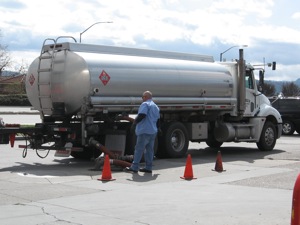But the courts aren’t finished with the next big piece of the state’s AB 32 climate strategy
By Thibault Worth

First it was go. Then it was stop. Now, it’s go again.
As of Monday, California’s groundbreaking Low Carbon Fuel Standard (LCFS) was back on track for implementation after the Ninth Circuit Court of Appeals issued a stay of an injunction against an earlier lower court ruling.
In a statement, the state’s Air Resources Board, which is responsible for the regulation, said the court’s decision would allow California to “continue implementation and resume enforcement of this important program to reduce greenhouse gas emissions.” [full statement PDF]
LCFS aims for a ten-percent reduction in the “carbon intensity” of gasoline and diesel fuels by 2020, by using a “life-cycle” approach. That means the standard looks beyond the carbon released during combustion, tallying up emissions from drilling (or harvesting in the case of biofuels), refining, and transporting of fuels.
The standard has fueled plenty of opposition from the oil industry, which argues that the Air Board has grossly overestimated how much biofuel can be brought to market to offset higher-carbon fossil fuels. The Western States Petroleum Association calls the LCFS a “disaster-in-the-making” that will raise the price of fuel for consumers.
Last December, Judge Lawrence D. O’Neill of the U.S. District Court for the Eastern District of California sided with Midwestern ethanol producers who argued that the standard would penalize their use of coal-fired electricity for refining activities, as well as their transport of fuels to California. O’Neill ruled that the LCFS violated the Commerce Clause of the United States and issued a preliminary injunction blocking the ARB from further action. The Air Board appealed the lower court’s decision in January.
Stanley Young, a spokesman for ARB, says that California isn’t telling out-of-state fuel producers how to run their businesses, only that they need to find a way to reduce the carbon intensity of their fuels if they want to do business here. He also argues that the standard will drive innovation and investment in California fuel industry.
The Ninth Circuit’s will continue to review ARB’s appeal of the lower courts decision while the stay is in effect.
2 thoughts on “California’s Low-Carbon Fuel Standard Back on Track — For Now”
Comments are closed.

I believe CA already has the highest gasoline cost in the 48 states due to earlier CARB regulations – this will only push gasoline costs higher, hurting families and businesses large and small, a costly ripoff of Californians to support propagation of the carbon emission hoax
(man causes global warming!) . And even if the hoax were true, the CA contribution to reduction of atmospheric CO2 would be not only negligible it would be undetectable, It is time to bury AB 32 and S375
I can’t wait to see how fast and how much – > the prices on everything go up.